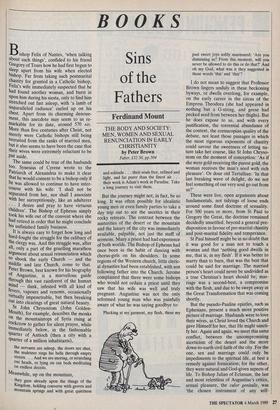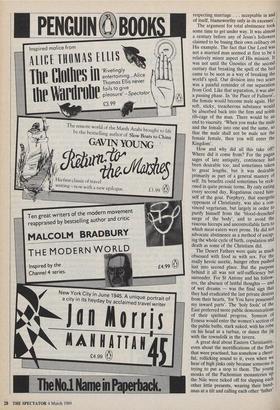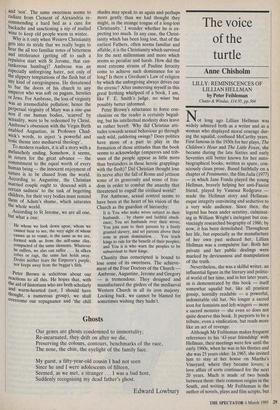BOOKS
Sins of the Fathers
Ferdinand Mount
THE BODY AND SOCIETY: MEN, WOMEN AND SEXUAL RENUNCIATION IN EARLY CHRISTIANITY by Peter Brown Faber, 82.50, pp.504 Bishop Felix of Nantes, 'when talking about such things', confided to his friend Gregory of Tours how he had first begun to sleep apart from his wife when elected bishop. Far from taking such postmarital chastity for granted in a Catholic bishop, Felix's wife immediately suspected that he had found another woman, and burst in upon him during his siesta, only to find him stretched out fast asleep, with 'a lamb of unparalleled radiance' curled up on his chest. Apart from its charming denoue- ment, this anecdote may seem to us re- markable for its date, around 570 AD. More than five centuries after Christ, not merely were Catholic bishops still being recruited from the ranks of married men, but it also seems to have been the case that their wives were extremely reluctant to be Put aside.
The same could be true of the husbands too. Synesius of Cyrene wrote to the Patriarch of Alexandria to make it clear that he would consent to be a bishop only if he was allowed to continue to have inter- course with his wife: 'I shall not be separated from her, nor shall I associate with her surreptitiously, like .an adulterer . • . I desire and pray to have virtuous children'. The Bishop of Ephesus simply took his wife out of the convent where she had retired in order that he might conclude is unfinished family business. It is always easy to forget how long and hard-fought the struggle for the celibacy of the clergy was. And this struggle was, after all, only a part of the gruelling marathon argument about sexual renunciation which so shook the early Church — and the Middle and late Church, come to that. Peter Brown, best known for his biography of Augustine, is a marvellous guide through this vast rainforest of the human Mind — dank, infested with all kind of fevers, vapours and venoms, occasionally virtually impenetrable, but then breaking out into clearings of great natural beauty. St John Chrysostom (John Golden- Mouth), for example, describes the monks on the mountaintops of Syria rising at cockcrow to gather for silent prayer, while immediately below, in the fashionable quarter of Antioch (then a city with a quarter of a million inhabitants),
the servants are asleep, the doors are shut, the muleteer rings his bells through empty streets . . . And we are snoring, or scratching our heads, or lying on our beds meditating on endless deceits.
Meanwhile, up on the mountain,
they gaze already upon the things of the Kingdom, holding converse with groves and mountain springs and with great quietness and solitude . . . their souls free, refined and light, and far purer than the finest air . . . their work is Adam's work in Paradise. Take a long journey to visit them.
But the journey might not, in fact, be so long. It was often possible for idealistic young men or even family parties to take a day trip out to see the ascetics in their rocky retreats. The contrast between the austerities of the desert or the mountain and the luxury of the city was immediately available, palpable, not just the stuff of sermons. Many a priest had had experience of both worlds. The Bishop of Ephesus had once been in the habit of dancing with chorus-girls on his shoulders. In some regions of the Western church, little cleric- al dynasties had been established, with son following father into the Church. Jerome complained that there were some bishops who would not ordain a priest until they saw that his wife was well and truly pregnant. Augustine was not the only reformed young man who was painfully aware of what he was saying goodbye to:
Plucking at my garment, my flesh, these my past sweet joys softly murmured: 'Are you dismissing us? From this moment, will you never be allowed to do this or do that?' And oh my God, what was it they suggested in those words 'this' and 'that'?
I do not mean to suggest that Professor Brown lingers unduly in these beckoning byways, or dwells overlong, for example, on the early career in the circus of the Empress Theodora (she had appeared in nothing but a G-string, and geese had pecked seed from between her thighs). But he does expose to us, and with every justification, the torrential abundance of the context, the cornucopian quality of the debate, not least those passages in which the most rigorous exponents of chastity could savour the sweetness of letting na- ture take her course, like St John Chryso- stom on the moment of conception: 'As if she were gold receiving the purest gold, the woman receives the man's seed with rich pleasure'. Or dour old Tertullian: 'In that last breaking wave of delight, do we not feel something of our very soul go out from us?'
These were live, open arguments about fundamentals, not tidyings of loose ends around some fixed doctrine of sexuality. For 500 years or more, from St Paul to Gregory the Great, the doctrine remained decidedly unsettled, beyond a general pre- disposition in favour of pre-marital chastity and post-marital fidelity and temperance.
St Paul himself might be in no doubt that it was good for a man not to touch a woman and that 'nothing good dwells in me, that is, in my flesh'. If it was better to marry than to burn, that was the best that could be said for marriage. The married person's heart could never be undivided as a true Christian's heart should be; mar- riage was a second-best, a compromise with the flesh, and due to be swept away in the Great Transformation that was coming shortly. But the pseudo-Pauline epistles, such as Ephesians, present a much more positive picture of marriage. Husbands were to love their wives, as Christ loved the Church and gave Himself for her, that He might sancti- fy her. Again and again, we meet this same conflict, between the uncompromising asceticism of the desert and the more down-to-earth civil faith of the city. For the one, sex and marriage could only be impediments to the spiritual life, at best a remedy against fornication; for the other, they were natural and God-given aspects of life. To Bishop Julian of Eclanum, the last and most relentless of Augustine's critics, sexual pleasure, the calor genitalis, was 'the chosen instrument of any self- respecting marriage . . . acceptable in and of itself, blameworthy only in its excesses'.
The argument for total abstinence took some time to get under way. It was almost a century before any of Jesus's followers claimed to be basing their own celibacy on His example. The fact that Our Lord was not a married man seemed at first to be a relatively minor aspect of His mission. It was not until the Gnostics of the second century that breaking the spell of the bed came to be seen as a way of breaking the world's spell. Our division into two sexes was a painful reminder of our separation from God. Like that separation, it was also a passing phase. In 'the Place of Fullness', the female would become male again. Her soft, sticky, treacherous substance would be absorbed back into the firm and noble rib-cage of the man. There would be an end to viscosity. 'When you make the male and the female into one and the same, so that the male shall not be male nor the female female, then you will enter the Kingdom'.
How and why did all this take off? Where did it come from? For the pagan sages of late antiquity, continence had been desirable too, and sometimes taken to great lengths, but it was desirable primarily as part of a general mastery of self. Its benefits could sometimes be reck- oned in quite prosaic terms. By only eating every second day, Rogatianus cured him- self of the gout. Porphyry, that energetic opponent of Christianity, was also a con- vinced vegetarian, but largely in order to purify himself from the 'blood-drenched surge of the body', and to avoid the raucous hiccups and uncontrollable farts to which meat-eaters were prone. He did not advocate abstinence as a method of escap- ing the whole cycle of birth, copulation and death as some of the Christians did.
The Desert Fathers were quite as much obsessed with food as with sex. For the really heroic ascetic, hunger often pushed lust into second place. But the purpose behind it all was not self-sufficiency but surrender. For St Antony and his follow- ers, the absence of lustful thoughts — and of wet dreams — was the final sign that they had eradicated the last private desires from their hearts, 'for You have possessed my inward parts'. The 'holy fools' of the East preferred more public demonstrations of their spiritual progress. Symeon of Ernesa would enter the women's section of the public baths, stark naked, with his robe on his head as a turban, or dance the jig with the townsfolk in the tavern.
A great deal about Eastern Christianity, even about the mortification of the flesh that were practised, has somehow a cheer-
ful, rollicking sound to it, even when we hear of high jinks only because someone Is trying to put a stop to them. The young monks of the Pachomian monasteries luP the Nile were ticked off for slipping each
other little presents, wearing their band; anas at a tilt and calling each other 'father and 'son'. The same sweetness seems to radiate from Clement of Alexandria re- commending a hard bed as a cure for backache and sanctioning a nip of mulled wine to keep old people warm in winter. Why is it only when Western Christianity gets into its stride that we really begin to hear the all too familiar notes of bitterness and intolerance (getting off to such a repulsive start with St Jerome, that can- tankerous humbug)? Ambrose was an especially unforgiving hater, not only of the slippery temptations of the flesh but of any kind of easygoingness. He threatened to bar the doors of his church to any emperor who was soft on pagans, heretics or Jews. For Ambrose, the loss of virginity was an irremediable pollution; hence the Perpetual virginity of Mary was a sine qua non if our human bodies, 'scarred' by sexuality, were to be redeemed by Christ. Ambrose's obsession with the Virgin Birth enabled Augustine, in Professor Chad- wick's words, to inject 'a powerful and toxic theme into mediaeval theology'. To modern readers, it is all a story with a melancholy ending. Somehow, it seems, 111 return for the great advance — the commitment to the equal worth of every human being — the innocent enjoyment of nature is to be chased from the world. According to Augustine, the Christian married couple ought to 'descend with a certain sadness' to the task of begetting children, for their very bodies must remind them of Adam's shame, which saturates the whole world.
According to St Jerome, we are all one, but what a one: He whom we look down upon, whom we cannot bear to see, the very sight of whom causes us to vomit, is the same as we are, formed with us from the self-same clay, compacted of the same elements. Whatever he suffers, we also can suffer . . In silken robes or rags, the same lust holds sway. Desire neither fears the Emperor's purple, nor keeps away from the beggar's filth.
Peter Brown is solicitous about our reactions to all this. He hopes that, with the aid of historians who are both scholarly and warm-hearted (not, I should have thought, a numerous group), we shall overcome our repugnance and 'the chill shades may speak to us again and perhaps more gently than we had thought they might, in the strange tongue of a long-lost Christianity.' I wonder whether he is ex- pecting too much. In any case, the Christ- ianity which has been long lost, that of the earliest Fathers, often seems familiar and affable; it is the Christianity which survived for the next millennium and more which seems so peculiar and harsh. How did the most extreme strains of Pauline ferocity come to achieve such dominance for so long? Is there a Gresham's Law of religion by which the unforgiving always drives out the eirenic? After immersing myself in this great frothing whirlpool of a book, I am, like F. E. Smith's judge, no wiser but possibly better informed.
Peter Brown's reluctance to force con- clusions on the reader is certainly beguil- ing, but his intellectual modesty does leave us rather bereft. Why did Christian atti- tudes towards sexual behaviour go through such wild, juddering swings? Does politics have more of a part to play in the formation of those attitudes than the book seems to acknowledge (emperors and trib- unes of the people appear as little more than bystanders in these heroic grapplings with the flesh)? Did Christian thought lose its nerve after the fall of Rome and jettison some of its generosity and sense of free- dom in order to combat the anarchy that threatened to engulf the civilised world?
For Ambrose, sexual control seems to have been at the heart of his vision of the Church as the guardian of hierarchy: It is You who make wives subject to their husbands. . . by chaste and faithful obedi- ence; You set husbands over their wives; You join sons to their parents by a freely granted slavery, and set parents above their sons in pious domination. . . You teach kings to rule for the benefit of their peoples; and You it is who warn the peoples to be subservient to their kings.
Chastity thus conscripted is bound to lose some of its sweetness. The achieve- ment of the Four Doctors of the Church —. Ambrose, Augustine, Jerome and Gregory — is tremendous. They designed and manufactured the girders of the mediaeval Western Church in all its iron majesty. Looking back, we cannot be blamed for sometimes wishing they hadn't.


















































 Previous page
Previous page